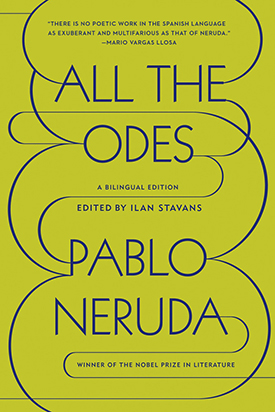Pablo Neruda wrote a total of 225 odes. The number stands as a pledge of alliance with a lyrical form he adored. He was also fond of other poetic forms (the sonnet, for instance), but as a practitioner of verso libre, unrhymed poetry, the ode was unquestionably the closest to his heart. He discovered it in his youth, becoming hypnotized by its fresh, elastic, invigorating freedom. His early readings of Horace, Pindar, Ovid, and Catullus left a deep impression on him. And he admired the way Romantics such as John Keats not only addressed universal themes in their odes but humanized those themes by turning them—Love and Psyche, for instance—into interlocutors. Neruda’s odes are his direct, uncensored dialogues with nature. And they are politically charged.
The classical ode was designed to be sung to music, often the lyre. Depending on the poet, it had three sections (in Pindar’s case), or four (in Horace’s case). The English odes produced not only by Keats but also by Dryden, Coleridge, and Shelley streamlined the structure, making it less formal. Neruda took that simplicity even further. He democratized the ode by using it to celebrate the mundane. His topics are a veritable catalogue of the quotidian: a chair, an onion, a pair of shoes, a train station, the dictionary, a village theater, a lover’s hands…In other words, he championed the significance of insignificance.
“In my work,” he stated in Confieso que he vivido (Memoirs), published in 1974, the year after his death at the age of sixty-nine, “I have tried to prove that the poet can write about any given subject, about something needed by a community as a whole.” Paying tribute to his predecessors, the Pindars and Ovids of antiquity, he profiles himself as a link between life as we see it on the surface and the undercurrent pathos only he is allowed to grasp. “Give me the sorrow / of the entire world,” Neruda writes, and “I will turn it into hope.”
“Give me the sorrow / of the entire world,” Neruda writes, and “I will turn it into hope.”
In his stanzas, he portrays himself as a troubadour in a state of constant communion with nature, a mystic in love with all things in his environment, seeking to articulate that love and often realizing that words alone are fatuous, inadequate, limited. He perceives himself as an alchemist making lists, chaotic lists, lists filled with repetition, nonsequential lists, an engineer exploring the workings of the world, not only for his own sake but for the sake of the rest of us, in particular the peoples of Latin America, the continent he championed and sought to represent throughout his life, while encouraging it to find courage, to define a vision for its future. As much a poet as he was a prophet, Neruda conceived his most dazzling odes as hymns to our humanity.
Simultaneously luscious and lustrous, the odes are a treat to the senses, invoking a wide assortment of smells, tastes, and images. But they normally resist a coherent, linear narrative. Instead, they feel as if the poet were slowly editing a dreamlike, surrealistic movie about a world in constant chaos. If forced to explain how they work, I would say that Neruda’s odes are like a beatnik’s stream of consciousness, which explains the ardent devotion he constantly awakens among young people. The majority are made up of only a handful of sentences, cut into smaller parts by a melodious, idiosyncratic use of colons and commas. The poet keeps almost completely away from other types of punctuation. Only on rare occasion does a question mark show up and even less frequently an exclamation point. In short, Neruda isn’t a minimalist as much as he is an essentialist. What he wants most is to be natural, confessional, and pleasurable.
It is therefore unsurprising to discover that Neruda didn’t quite believe in originality. “It is just one more fetish made up in our time, which is speeding dizzily to its collapse,” he wrote in his Memoirs. “I believe in personality reached through any language, any form, any creative means used by the artist.” He trusted that poetry, all types of poetry, and especially his own, had no owner. It was centrifugal and enduring, earthly and eternal. And it belongs to everyone.
(A condensed version of Ilan Stavans’s Introduction to All the Odes)
Ode to the Dictionary // Oda al diccionario
Translated by Ilan Stavans
Back like an ox, beast
of burden, systematic
dense book:
young
I ignored you, I was visited
by smugness
and I thought myself complete,
and plump like a
melancholy toad
I proclaimed: “I receive
words
directly
from the roaring Mount Sinai.
I shall reduce
forms into alchemy.
I am a magus.”
The great magus said nothing.
The Dictionary,
old and heavy, with its scruffy
leather jacket,
was silent,
its test tubes undisplayed.
But one day,
after having used it
and perused it,
after
declaring it
a useless and anachronistic camel,
when for long months, without protest,
it served as an armchair
and a pillow,
it rebelled, and plated itself
in my doorstep,
it expanded, shook its leaves
and nests,
it moved the elevation of its foliage:
it was
tree,
neutral,
generous,
apple tree, apple orchard, or apple blossom,
and the words
shining in their inexhaustible cup,
opaque or sonorous,
fertile in the lodging of language,
charged with truth and sound.
I turn
to a single one
of its
pages:
Cape
Cartridge
how wonderful
to pronounce these syllables
with air,
and further on,
Capsule
hollow, awaiting oil or ambrosia,
and near them
Captivate Capture Capuchin
Carousel Carpathian
words
as slippery as smooth grapes
or exploding in the light
like blind seeds awaiting
in the storehouse of vocabulary
alive again and given life:
once again the heart is burning them.
Dictionary, you are not
tomb, sepulcher, coffin,
tumulus, mausoleum,
but preservation,
hidden fire,
plantation of rubies,
living eternity
of essence,
granary of language.
And it is wonderful
to harvest in your fields
a lineage
of words,
the severe
and forgotten
sentence,
daughter of Spain,
hardened
like a plow blade,
fixed in its limit
of antiquated tool,
preserved
in its exact beauty
and the immutability of a medallion.
Or another
word
we find hiding
between lines
that suddenly seems
as delicious and smooth in our mouths
as an almond
or as tender as a fig.
Dictionary, let one
of your thousand hands, one
of your thousand emeralds,
a
single
drop
of your virginal springs,
one grain
of
your
magnanimous granaries
fall
at the right moment
on my lips,
the thread of my pen,
into my inkwell.
From the dense and sonorous
depths of your jungle,
give me,
when I need it,
a single birdsong, the luxury
of a bee,
the fallen fragment
of your ancient wood perfumed
by an eternity of jasmine,
one
syllable,
one tremor, one sound,
one seed:
I am made of earth and with words I sing.
Pablo Neruda (1904–73) was awarded the Nobel Prize in Literature in 1971. His books include Residence on Earth, Canto General, Extravagaria, and Isla Negra.
Ilan Stavans is the Lewis-Sebring Professor in Latin American and Latino Culture at Amherst College.

